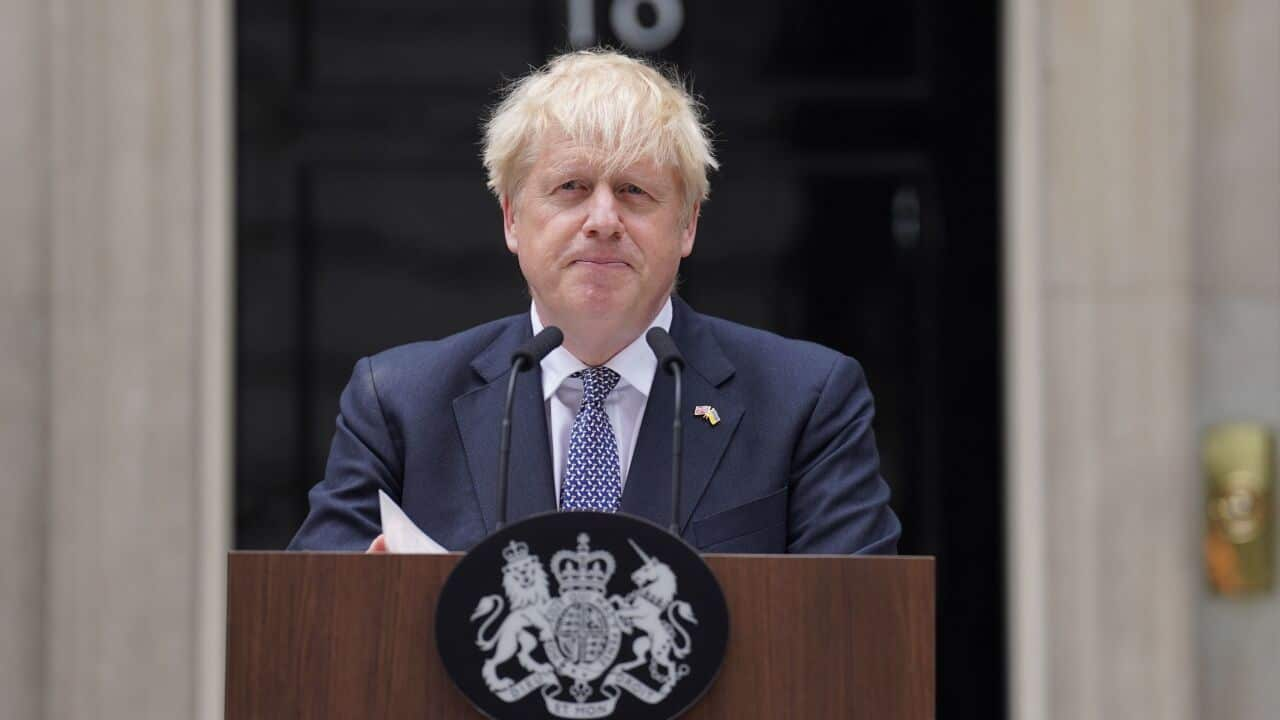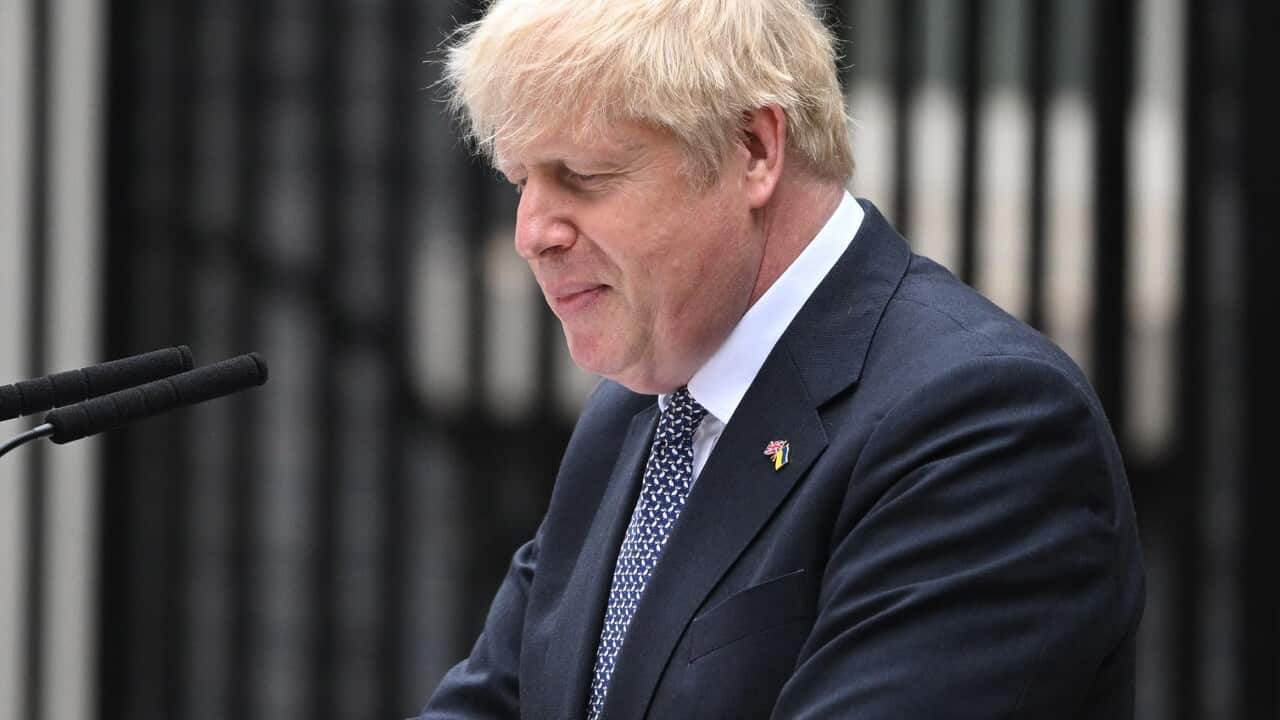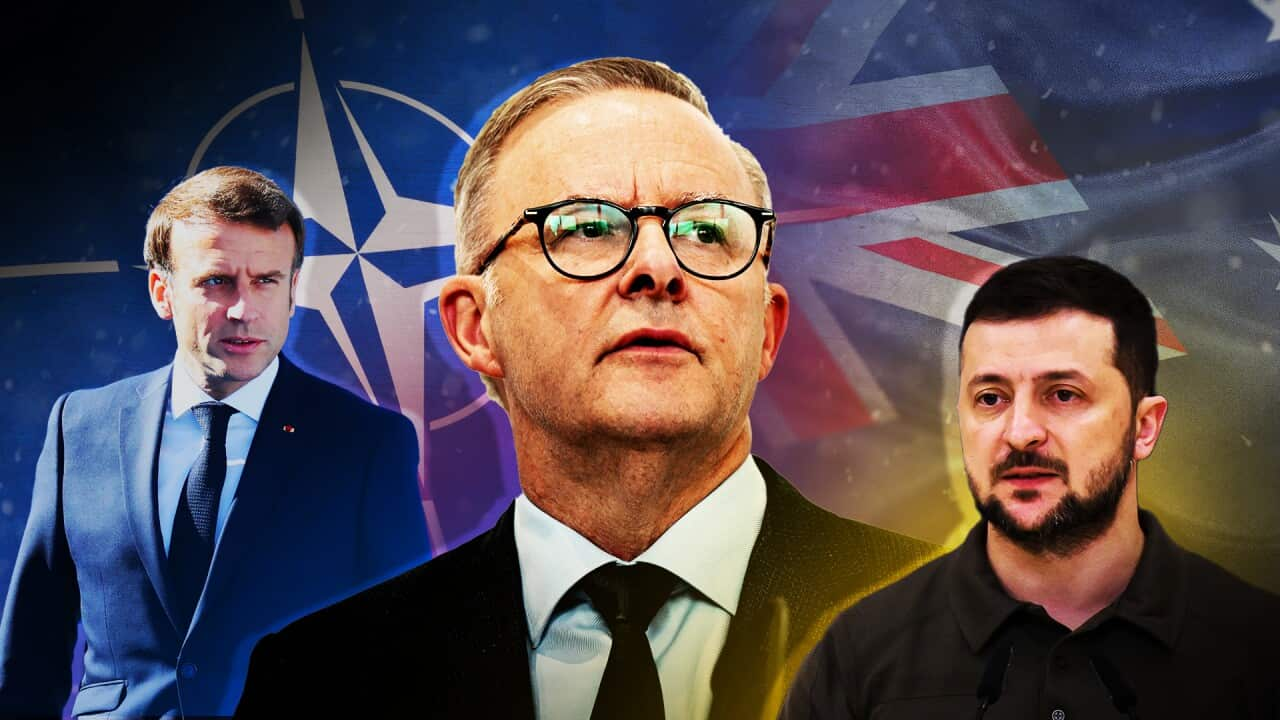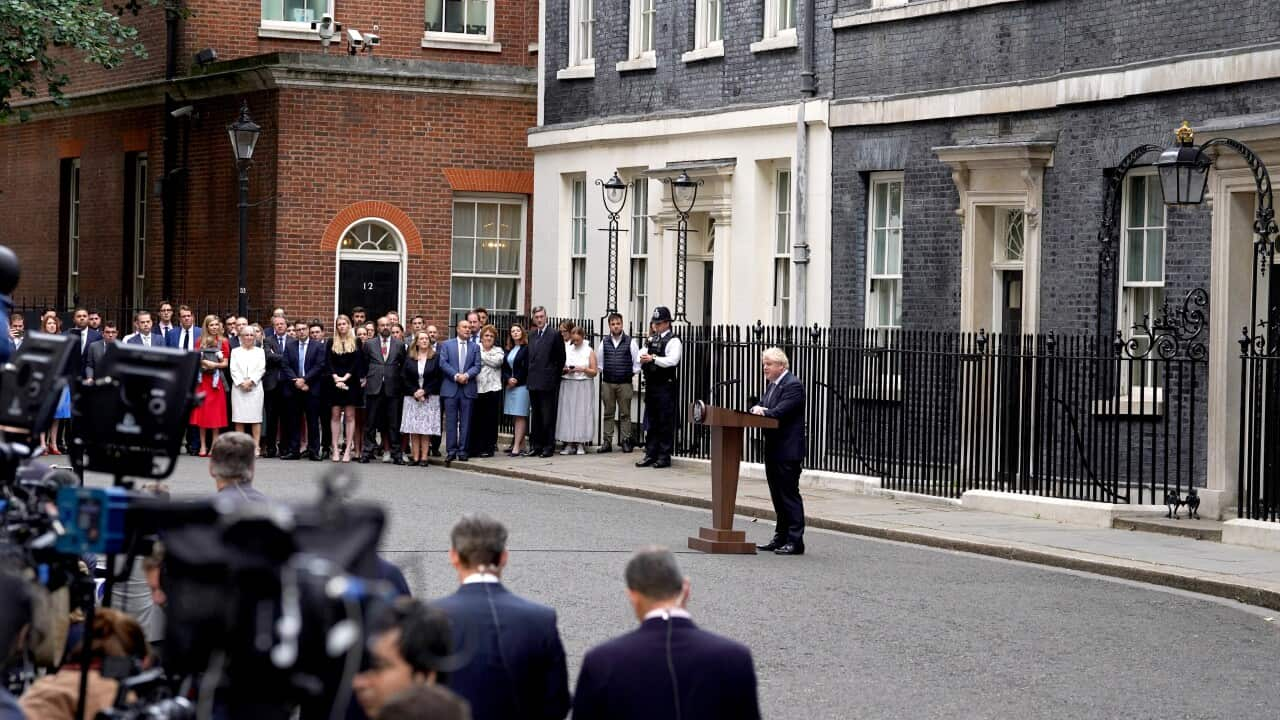Britain's Boris Johnson plans to continue as a member of parliament when he steps down as prime minister, one of his close aides said on Thursday.
Mr Johnson announced earlier on Thursday he would quit as prime minister, but stay in the post until his successor was chosen.
"Good to hear the boss will carry on as an MP," James Duddridge, Mr Johnson's parliamentary private secretary, said on Twitter.
Mr Johnson resigned on Thursday as leader of Britain's Conservative party, triggering a race to succeed him as prime minister after a frenzied 48 hours which saw dozens desert his scandal-hit government.
Mr Johnson acknowledged it was "clearly the will of the parliamentary Conservative party that there should be a new leader of that party, and therefore a new prime minister".
In a speech outside 10 Downing Street, he said he would stay on until his successor is found but faced calls to leave immediately and for an acting leader to be appointed.
"It is clearly now the will of the parliamentary Conservative Party that there should be a new leader of that party and therefore a new prime minister," Mr Johnson said.
First candidate launches leadership bid
British Conservative MP Tom Tugendhat said late Thursday he was launching his bid to succeed Mr Johnson, the first candidate to announce their campaign since the premier announced his resignation.
In an opinion piece in the Daily Telegraph, Mr Tugendhat who heads parliament's foreign affairs committee, confirmed his intention to stand for the leadership of the Conservative party, saying he wanted to bring together a "broad coalition" for a "clean start".
"I have served before -- in the military, and now in Parliament. Now I hope to answer the call once again as prime minister," he wrote.
Mr Tugendhat had indicated he would stand in any leadership contest but there is no love lost between him and Mr Johnson's loyalists.
A hawk on China, he has been critical of the government's handling of the troop withdrawal from Afghanistan. The timetable to nominate Mr Johnson's replacement will be set out next week.
Conservative John Major, who was prime minister from 1990 to 1997, said Mr Johnson's extended tenure -- and the powers that still go with it -- was "unwise and may be unsustainable".
The leadership election will take place in the coming months. The victor will replace Mr Johnson by the party's annual conference in early October.
But polling suggested most Britons favour his immediate exit, amid claims that he is only hanging on to enjoy a wedding party at his government-funded country retreat.
Mr Johnson's tumultuous three years in office were defined by Brexit, the Covid pandemic and non-stop controversy about his reputation for mendacity.
'Best job'
Mr Johnson said he was "sad... to be giving up the best job in the world", justifying his fight to stay on to deliver the mandate he won in a Brexit-dominated general election in December 2019.
In the six-minute address, watched by his few remaining Tory allies and his wife Carrie, he promised support for Ukraine "for as long as it takes".
Mr Johnson reiterated his backing in a call afterwards to President Volodymyr Zelenskyy, Downing Street said. Mr Zelenskyy said he and Ukraine would be sad to see him go, praising his "personal leadership" and "charisma".
Defence minister Ben Wallace and Rishi Sunak, whose departure as finance minister on Tuesday sparked the cabinet exodus, were among the early front-runners, a YouGov survey of Tory members suggested.
Foreign Secretary Liz Truss, another potential contender, said Mr Johnson had "made the right decision" as she cut short a trip to Indonesia for a G20 meeting.
"We need calmness and unity now and to keep governing while a new leader is found," she tweeted.
Australia-UK ties will survive resignation, Anthony Albanese says
Australia's relationship with the United Kingdom is expected to remain strong no matter who is chosen to replace Boris Johnson as prime minister.
Prime Minister Anthony Albanese said Mr Johnson's plight was a reminder of how tough politics can be.
"This is a difficult process for Boris personally, but I'm sure that the Australia-UK relationship will continue to thrive in the future," he told the Nine Network on Friday.
Mr Albanese said Mr Johnson's forward-leaning response to Russia's invasion of Ukraine set an example for the rest of the world to take action.
UK Foreign Secretary Liz Truss is widely expected to replace Mr Johnson as prime minister. Mr Albanese met Ms Truss during the NATO summit in Madrid.
"We will work with whoever the UK Conservative Party elect as the new leader and therefore the new prime minister," he said. "Our relations are not relations between individuals, they're relations between peoples and our countries."
'Close ties'
The United States will continue its "close cooperation" with Britain including their joint support for Ukraine against Russian aggression, US President Joe Biden said Thursday, hours after Mr Johnson announced his resignation.
"The United Kingdom and the United States are the closest of friends and allies, and the special relationship between our people remains strong and enduring," Mr Biden said in a statement.
"I look forward to continuing our close cooperation with the government of the United Kingdom," he added, including "maintaining a strong and united approach to supporting the people of Ukraine as they defend themselves against Putin's brutal war on their democracy, and holding Russia accountable for its actions."
The initial statement by Mr Biden provided by the White House made no mention of Mr Johnson by name.
When David Cameron quit as Britain's prime minister in 2016 in the wake of the Brexit referendum, US then-president Barack Obama hailed him as "an outstanding friend and partner on the global stage."
Even while eyeing the exit, Mr Johnson sought to steady the ship, making several appointments to replace departed cabinet members. They included Greg Clark, an arch "remainer" opposed to Britain's divorce from the European Union, which Mr Johnson had championed.
The inexperienced Shailesh Vara was put in charge of Northern Ireland, with the government locked in battle with Brussels over post-Brexit trading rules for the tense territory.
Convening the new-look cabinet after his resignation speech, Mr Johnson confirmed his lame-duck status by saying "major fiscal decisions should be left for the next prime minister", according to Downing Street.
As late as Wednesday night, Mr Johnson had been defiantly clinging on to power despite a wave of more than 50 government resignations.
He sacked minister Michael Gove, with a Downing Street source describing Mr Johnson's former Brexit right-hand-man as a "snake" in the media.
But the departure early Thursday of education minister Michelle Donelan and a plea to quit from finance minister Nadhim Zahawi, who have only in their jobs for two days, tipped the balance.
'Arrogant and delusional'
Tory MPs also warned him of a new no-confidence vote. Mr Johnson triumphed in 2019 with a vow to "get Brexit done" following Britain's shock referendum decision three years prior. But for many, the populist, convention-defying leader had outstayed his welcome.
The Conservative infighting erupted at a time when millions of Britons are battling the worst slump in living standards since the 1950s, fueled by rocketing energy prices on the back of the war in Ukraine.
Mr Johnson's popularity had already slumped over a series of lockdown-breaking parties in Downing Street, which saw him become the first prime minister to receive a police fine.

Remain protester Steve Bray shouts at the media on College Green after Boris Johnson resigned on Thursday. Source: Getty / Claire Doherty/In Pictures via Getty Images
While Mr Johnson oversaw a successful coronavirus vaccine campaign, the former journalist also oversaw one of Europe's worst death tolls, and nearly died himself from COVID-19 in April 2020.
"Boris Johnson's legacy is the deaths of nearly 200,000 British people on his watch," said Lobby Akinnola, from the campaign group COVID-19 Bereaved Families for Justice.
After-dinner speeches
"Whilst Johnson will move on to a life of writing newspaper columns and being paid eye-watering amounts to give after-dinner speeches, there will be no moving on for the families like mine that have been ripped apart by his actions," he said.
Mr Sunak and health secretary Sajid Javid quit late on Tuesday after Johnson apologised for his February appointment of a senior Conservative MP to a prominent role in parliament.
Chris Pincher resigned as deputy chief whip last week following accusations that he drunkenly groped two men.
Downing Street officials eventually conceded that Mr Johnson had known about other allegations against Mr Pincher back in 2019, and many ministers recoiled at having to defend the appointment.
Tony Travers, director of the think tank LSE London, said the party had once again shown its propensity to turn on unpopular leaders after previously ditching premiers Margaret Thatcher and Theresa May.
"The truth is that the reason the Conservative party is so durable is that it will get rid of its leaders when it thinks they are harming the party," he said. "And this allows the party to start again with a new leader and say, 'look, we're a completely different enterprise'."












